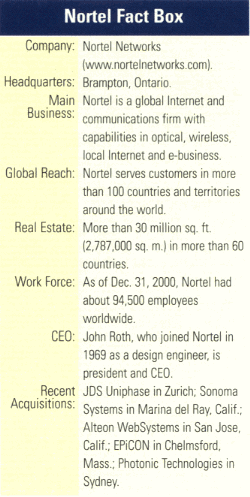A |
TLANTA — When Nortel Networks announced Feb. 15 that it would eliminate 10,000 jobs — or more than 10 percent of its global work force of 94,500 — it was further evidence that the economic slowdown had spread beyond the dot-coms.

The dreaded “L” word — layoffs — had reached the companies building the infrastructure of the information economy. The casualties of early 2001 read like a Who’s Who of the information age:
- Dell Computer Corp., the world’s leading direct computer systems company, announced Feb. 15 that it would eliminate 1,700 full-time positions, or about 4 percent of its work force.
- Alltel announced the same day that it would cut 1,000 communications jobs, or nearly 4 percent of its employees, as part of a reorganization of its wireless business.
- Amazon.com declared Jan. 31 that it would lay off 15 percent of its work force — 1,300 workers — at operations in Georgia and Washington, mostly in distribution and customer service positions.
- Business Week magazine reported Feb. 1 that General Electric would cut 75,000 jobs over the next two years, eliminating 15 percent of the company’s work force.
- WorldCom announced Feb. 28 that it would trim 5,000 jobs from its payroll in the United States, or about 7 percent of its work force.
While no one knows when the layoff announcements will end, corporate real estate executives at these and other companies are adjusting their space needs to reflect the personnel reductions.
 “My general sense is that, for at least the next 12 months, there’s going to be close scrutiny given to spending on space, and a lot of that spending may be deferred,” says Scott Smith (left), director of East Region Real Estate Strategic Planning and Operations for Nortel Networks in Alpharetta, Ga. “There is going to be space that comes back on the market, but the amount of space will not be huge unless the large telecom firms shut down whole divisions.”
“My general sense is that, for at least the next 12 months, there’s going to be close scrutiny given to spending on space, and a lot of that spending may be deferred,” says Scott Smith (left), director of East Region Real Estate Strategic Planning and Operations for Nortel Networks in Alpharetta, Ga. “There is going to be space that comes back on the market, but the amount of space will not be huge unless the large telecom firms shut down whole divisions.”The Brampton, Ontario-based Nortel announced its large-scale staff cuts following sharply reduced earnings and revenue forecasts for the year. Blaming a “severe economic downturn” and spending delays by U.S. telecom carriers, Nortel said it had no choice but to retrench.
“We are seeing longer-than-expected delays in spending by our U.S. customers as they continue to assess the impact of the economic and market conditions on their business,” Nortel CEO John Roth said at the time. “We now expect the U.S. market slowdown to continue well into the fourth quarter of 2001.”
As most of the telecom carriers began to cut back on their orders — largely as a result of rapidly falling prices for bandwidth — these same carriers became reluctant to add new capacity to their networks. Instead, they decided to let their existing capacity fill up with voice and data traffic.
Smith, who oversees all of Nortel’s real estate assets east of the Mississippi River except Raleigh, N.C., says that even though Nortel’s overseas markets remain strong, “the general trend right now is one of belt-tightening and uncertainty from service providers like BellSouth. They’re withholding capital for spending. As a result, this year is going to be more of a setback for the telecom sector in general.”
When asked how long he expected that setback to last, Smith replied, “My personal opinion is that the overall telecommunications segment of the U.S. economy is going to experience a flat year in 2001, and the overseas growth doesn’t make up for the slowdown in North America. I think companies here are saying, ‘Let’s get a better handle on where things are going before we commit large amounts of capital to expansion projects.’ “
For Smith, whose territory consists of more than 140 corporate sites totaling 4.1 million sq. ft. (380,890 sq. m.), that means his main challenge in 2001 will be “maintaining costs as a percent of revenue,” he says.
Despite the slowdown, Nortel is pressing ahead with a 377,000-sq.-ft. (35,023-sq.-m.) expansion of its regional campus on Windward Parkway near State Road 400 in Alpharetta, a northern Atlanta suburb. The project, which will consolidate several of the company’s operations around metro Atlanta, will house about 3,000 employees.
Companywide, Smith says, Nortel is not planning to return significant amounts of space back to the market, despite the job cuts. “Of course, if companies are being financially sound, one of the factors that must be considered in any cutback is the cost of real estate,” he says. “But I don’t see any one sector of the telecom industry giving up tons of space.”
Nortel manages its real estate differently than most companies. In the late 1990s, Nortel made a corporate decision to develop an Intranet system to manage all of its real estate needs worldwide. The company also reduced its list of 10,000 vendors to 10 main Mercury Partners.
Today, virtually every aspect of Nortel’s real estate operation is Web-enabled, and the company operates with fewer real estate executives than it did in the mid-1990s.

